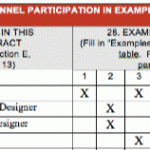
Last week, I told you about a game-changing book about proposal writing that I obtained the rights to.
Today, and over the next two weeks, I want to give you an advanced sneak peek and share some of my favorite excerpts with you right here on HelpEverybodyEveryday.com.
The first excerpt illustrates the tactical nature of this book. And this particular section hit home with me when I was first reading it.
Here it is…
—Start Book Excerpt—
Proposal Ghost Stories
Sometimes you may know who your competition is, and while you certainly don’t want to “trash” them and appear, at the least, impolite, you can still take the opportunity to emphasize your strengths and contrast them against those your competition lacks.
For example, if you find out that a competitor has been given a warning by a government agency or independent auditor because of poor financial management, or if they were cited for contract violations, wouldn’t it be helpful to show that you have never had such problems? A Ghost Story offers an excellent way to do it.
A properly presented Ghost Story can cause the reader to stop and think. And the conclusion the reader draws can effectively wound the competition.
A Ghost Story is a subtle way of pointing out your competitor’s shortcomings without actually pointing a finger directly at them. It simply raises questions in the reader’s mind which, when answered, will not flatter the competition.
The Ghost Story makes a veiled reference to something you know about the competitor’s practices which may already be known by the reader or which may prompt the reader to look into the circumstances.
For example, if you knew that a competitor had been warned on an audit because they “padded” their budget in order to buy some sophisticated equipment that they then kept for their own use, you might include a Ghost Story like this:
Lease or Purchase? We Know When To Do Which!
We want to keep costs down. That’s why we won’t waste your money on expensive equipment that has a short-term use, expecting to keep it for ourselves. The technique we’ve proposed is especially economical because it only requires leasing equipment for the duration of the work, rather than purchasing the equipment and selling it at a loss later. This approach is far better (and definitely more ethical) than the “spend and keep” philosophy of some companies.
The reader of such a story may look closely at other proposals to see if they promote a “spend and keep” philosophy. They’re more likely to scrutinize the techniques your competitors might use and even ask questions about equipment purchased under their past contracts.
Obviously, having a particular bit of intelligence about a competitor makes a Ghost Story very effective.
—End Book Excerpt—
I hope you found that interesting. Next week, I’ll drop another book excerpt your way. You can also purchase the book at this link.
If you’re a subscriber, I want to hear from you. Tell me about a time when you could of, should have, used a ghost story in your proposal. Send me an email or post a comment below. I read every single one.





Hi, Matt – This post reminded me of a book called “How to get the competition fired without saying anything bad about them.” One of the book’s two main ideas is that you should demonstrate how, with the incumbent consultant, the owner is being underserved, by pointing out all that you bring to the table that the incumbent does not. I recommend that anyone interested should find the book in the library and read the first 20 pages. I found that to be the “meat” and the remainder was just explanations and examples. Thanks for this post. It should be useful to all your subscribers.
Thank you for the book recommendation Bernie!